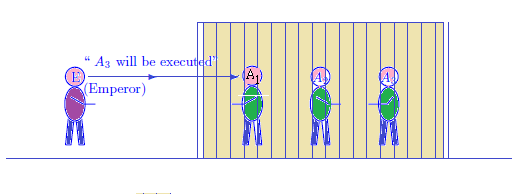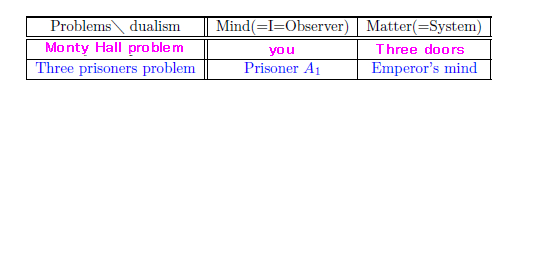9.10:Bayesian statistics: Monty Hall problem [three prisoners problem]
This section is extracted from
the following:
$(\sharp):$
S. Ishikawa;
The Final Solutions of Monty Hall Problem and Three Prisoners Problem
arXiv:1408.0963v1 [stat.OT] 2014
Bayesian statistics: Monty Hall problem[resp. three prisoners problem]
$\quad$ Suppose you are on a game show, and you are given
the choice of three doors
(i.e., " Door $A_1$"$\!\!\!,\;$ " Door $A_2$"$\!\!\!,\;$ " Door $A_3$"$\!\!)$.
Behind one door is a car, behind the others, goats.
You do not know what's behind the doors.
However, {you pick a door, say "Door $A_1$"}, and the host,
who knows what's behind the doors, opens another door,
{say " Door $A_3$"$\!\!\!,\;$ which has a goat}.
And he adds that
He says to you,
" Do you want to pick Door $A_2$?"$\;\;$
Is it to your advantage to switch your choice of doors?
$(\sharp_1):$
the car was set
behind the door
decided by the cast of the (distorted) dice.
That is,
the host set the car
behind Door $A_m$
with probability
$p_m$
(where
$p_1 + p_2 + p_3 =1$, $ 0 \le p_1 , p_2 , p_3 \le 1 $
$)$.

$\quad$
Three prisoners, $A_1$, $A_2$, and $A_3$ were in jail.
They knew that one of them was to be set free and
the other two were to be executed.
They did not know who was the one to be spared, but they know that
but the emperor did know the one to be spared.
$A_1$ said to the emperor,
"I already know that at least one the other two prisoners will be executed, so if you tell me the name of one who will be executed, you won't have given me any information about my own execution".$\;\;$
After some thinking, the emperor said,
"$A_3$ will be executed."$\;\;$
Thereupon $A_1$ felt happier because
his chance had increased from $\frac{1}{3(= {\rm Num}[\{A_1,A_2,A_3 \}])}$ to
$\frac{1}{2(= {\rm Num}[\{ A_1,A_2 \}])}$.
This prisoner $A_1$'s happiness may or may not be reasonable?
$(\sharp_2):$
the one to be spared
was
decided by the cast of the (distorted) dice.
That is,
Prisoner $A_m$ is to be spared
with probability
$p_m$
(where
$p_1 + p_2 + p_3 =1$, $ 0 \le p_1 , p_2 , p_3 \le 1 $
$)$.

In the dualism,
we have the confrontation
\begin{align}
\mbox{
"observer$\longleftrightarrow$system"
}
\end{align}
as follows.

Let $\Omega = \{ \omega_{1} , \omega_{2} , \omega_{3} \}$ be a state space with the discrete metric. Each pure state $\delta_{\omega_{{m}}} (\in {\frak S}^p (C(\Omega)^* ))$ means as follows.
\begin{align} & \delta_{\omega_{{m}}} \Leftrightarrow \mbox{The state such that a car is behind the door $A_m$} \nonumber \\ {[\mbox{resp.}} \;\;\; & \color{blue}{ \mbox{ $ \delta_{\omega_{{m}}} \Leftrightarrow $ } \mbox{ the state such that a pisoner $A_m$ is pardoned ] } } \nonumber \\ & \qquad \qquad (m=1,2,3 ) \tag{9.31} \end{align}The observable ${\mathsf O}_1$ $\equiv$ $(\{ 1, 2,3 \}, 2^{\{1, 2 ,3\}}, F_1)$ is defined by
\begin{align} & [F_1(\{ 1 \})](\omega_1)= 0.0,\qquad [F_1(\{ 2 \})](\omega_1)= 0.5, \qquad [F_1(\{ 3 \})](\omega_1)= 0.5, \nonumber \\ & [F_1(\{ 1 \})](\omega_2)= 0.0, \qquad [F_1(\{ 2 \})](\omega_2)= 0.0, \qquad [F_1(\{ 3 \})](\omega_2)= 1.0, \nonumber \\ & [F_1(\{ 1 \})](\omega_3)= 0.0,\qquad [F_1(\{ 2 \})](\omega_3)= 1.0, \qquad [F_1(\{ 3 \})](\omega_3)= 0.0, \tag{9.32} \end{align}Thus we have a mixed measurement ${\mathsf M}_{L^\infty (\Omega)} ({\mathsf O}_1, S_{[{}\ast{}]} ( \nu_0))$. Note that
| $(a):$ |
"measured value $1$ is obtained by
the measurement
${\mathsf M}_{L^\infty (\Omega)} ({\mathsf O}_1, S_{[{}\ast{}]})$"
$ \Leftrightarrow $ $ \left[\begin{array}{ll} \mbox{the host says "Door $A_1$ has a goat" } \\ \color{blue}{ \mbox{the emperor says "Prisoner $A_1$ will be executed" } } \end{array}\right] $ |
| (b): |
"measured value $2$ is obtained
by
the measurement
${\mathsf M}_{L^\infty (\Omega)} ({\mathsf O}_1, S_{[{}\ast{}]})$
"
$ \Leftrightarrow $ $ \left[\begin{array}{ll} \mbox{the host says "Door $A_2$ has a goat" } \\ \color{blue}{ \mbox{the emperor says "Prisoner $A_2$ will be executed" } } \end{array}\right] $ |
| (c): |
"measured value $3$ is obtained
by
the measurement
${\mathsf M}_{L^\infty (\Omega)} ({\mathsf O}_1, S_{[{}\ast{}]})$
"
$ \Leftrightarrow $ $ \left[\begin{array}{ll} \mbox{the host says "Door $A_3$ has a goat" } \\ \color{blue}{ \mbox{the emperor says "Prisoner $A_3$ will be executed" } } \end{array}\right] $ |
Here, assume that,
by the
statistical
measurement
${\mathsf M}_{L^\infty (\Omega)} ({\mathsf O}_1, S_{[{}\ast{}]} (\nu_0))$,
you obtain a measured value $3$,
which corresponds to
the fact that
$
\left[\begin{array}{ll}
\mbox{the host said
"Door $A_3$ has a goat"
}
\\
\color{blue}{
\mbox{the emperor said
"Prisoner $A_3$ is to be executed"
}
}
\end{array}\right]
$
Then, Bayes' theorem 9.11 says that the posterior state $\nu_{ post}$ $(\in {\cal M}_{+1}^m (\Omega))$ is given by
\begin{align} \nu_{ post} = \frac{F_1(\{3\}) \times \nu_0} {\bigl\langle \nu_0, F_1(\{3\}) \bigr\rangle}. \tag{9.33} \end{align} That is, \begin{align} & \nu_{ post} (\{ \omega_1 \})= \frac{\frac{p_1}{2}}{ \frac{p_1}{2} + p_2 }, \quad \nu_{ post} (\{ \omega_2 \})= \frac{p_2}{ \frac{p_1}{2} + p_2 }, \quad \nu_{ post} (\{ \omega_3 \}) = 0. \tag{9.34} \end{align} Then,| $(I_1):$ | In Problem 9.23, \begin{align} \left\{\begin{array}{ll} \mbox{ if $\nu_{ post} (\{ \omega_1 \})$ $<$ $\nu_{ post} (\{ \omega_2 \})$ (i.e., $p_1 < 2 p_2 $), you should pick Door $A_2$} \\ \mbox{ if $\nu_{ post} (\{ \omega_1 \})$ $=$ $\nu_{ post} (\{ \omega_2 \})$ (i.e., $p_1 = 2 p_2 $), you may pick Doors $A_1$ or $A_2$} \\ \mbox{ if $\nu_{ post} (\{ \omega_1 \})$ $>$ $\nu_{ post} (\{ \omega_2 \})$ (i.e., $p_1 > 2 p_2 $), you should not pick Door $A_2$} \end{array}\right. \end{align} |
| $(I_2):$ | In Problem 9.24, \begin{align} \left\{\begin{array}{ll} \mbox{ if $ \nu_{0} (\{\omega_1\}) < \nu_{\rm post} (\{\omega_1\})$ (i.e., $p_1 < 1- 2 p_2$), the prisoner $A_1$'s happiness increases } \\ \mbox{ if $ \nu_{0} (\{\omega_1\}) = \nu_{\rm post} (\{\omega_1\})$ (i.e., $p_1 = 1- 2 p_2$), the prisoner $A_1$'s happiness is invariant } \\ \mbox{ if $ \nu_{0} (\{\omega_1\}) > \nu_{\rm post} (\{\omega_1\})$ (i.e., $p_1 > 1- 2 p_2$), the prisoner $A_1$'s happiness decreases } \\ \end{array}\right. \end{align} |
